Yankees: How to extend their championship window

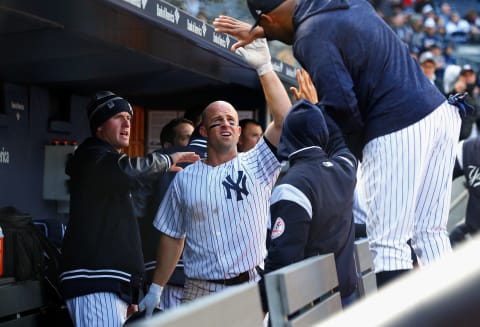
Given the strength and youth of their roster, the Yankees seem primed to be a World Series contender for a number of years. However, they cannot take that for granted and must do all they can to extend their championship window.
It might be easy to think the Yankees are in a good position to win now and in the future, but it is the front office’s job, especially when you work for the Yankees, to produce a consistent contender capable of winning a World Series every year.
As it stands now, the Yankees look like they could be contenders until at least 2023, as Aaron Judge, Gary Sanchez, and Luis Severino are all set to be free agents prior to that season. At this time, Judge will be 31 years old, Sanchez will be 30, and Severino will be 29. None of them will be too ancient but they won’t be at the prime age you hand out huge extensions for five-plus years to.
In addition, the Yankees will have about $30 million tied up in Giancarlo Stanton, along with the salaries of current prospects who will be arbitration-eligible such as Gleyber Torres, Miguel Andujar, Justus Sheffield, and Estevan Florial. They may also have salaries for Didi Gregorius and Greg Bird on the books if they decide to extend them, along with Jordan Montgomery’s final year of arbitration.
Andujar will likely be in his last year of arbitration, commanding anywhere from $10 – 17 million if he lives up to the hype. Torres will likely be in his second year of arbitration given how the Yankees manipulated his service time and could command roughly $10 million.
If only considering Stanton, Judge, Sanchez, Severino, Torres, and Andujar’s potential salaries, the Yankees payroll could be pushing $160+ million for 2023. Now add in other arbitration salaries, free agent salaries (especially if it’s a Bryce Harper or Manny Machado), and rookie contracts, and it’s easy to see their payroll well above $200 million.
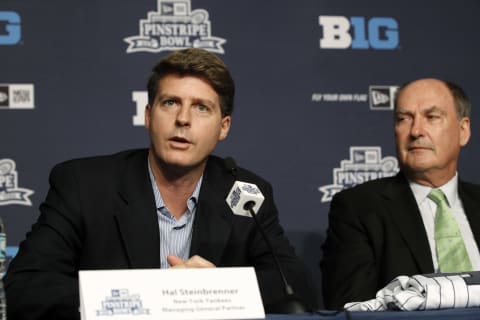
When looking at these salary figures, it’s obvious to see that the Yankees will have some tough financial decisions to make. With possible extensions looming for prospects like Torres and Andujar, they probably won’t be able to keep their entire core, despite the luxury tax set to rise to $210 million by 2021.
Yes, hopefully, Hal Steinbrenner will be willing to exceed the luxury tax, but he doesn’t seem to think spending big is necessary for the Yankees to win a World Series. While it seems likely the Yankees will exceed the tax, we should not expect them to shatter the threshold like they used to in the past. This is mainly due to the harsh penalties levied on teams who do surpass it.
As one team president told Jeff Passan of Yahoo:
“The luxury tax might as well be a [salary] cap.”
Because of this, the Yankees likely won’t want to extend all of their players to contracts that pay them big salaries into their mid-30s. This could risk them fielding a team much like the Yankees of recent past, who had little flexibility and popularity with fans as they were held down by big-money contracts to old players such as A-Rod, CC, Teixeira, Ellsbury, McCann, and Beltran.
Now the question is, how can the Yankees extend their championship window without saddling themselves with hefty salary obligations to players past their primes? The answer is giving out pre-arbitration extensions to core players beginning as soon as this season.
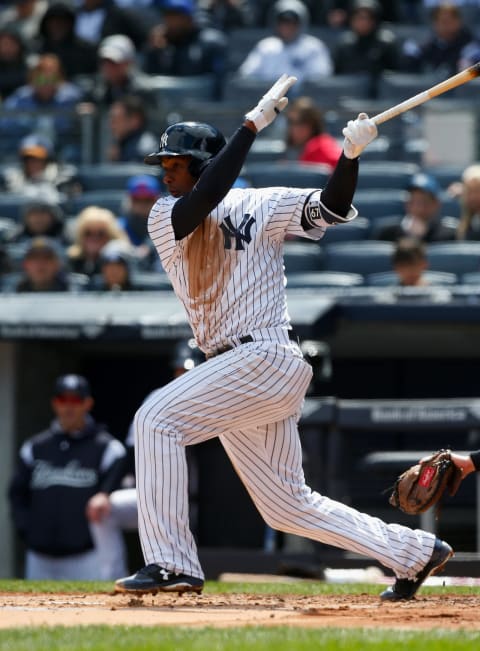
The rationale behind these extensions is you pay a player more upfront in order to buy out an extra year or two of free agency. These deals often end up as some of the best value deals in baseball, greatly benefitting the team.
In the Yankees case, extensions like these can help them extend their championship window a couple of years by locking up their core players at bargain prices before they significantly decline.
The Yankees would also have to decide who to offer these extensions too, which is a difficult question in its own right. I would first look towards Torres and Andujar, using Scott Kingery’s extension with the Phillies as a starting point.
While Andujar will have some time to prove himself in the majors before any extension is reached, he is also not as highly ranked on prospect lists such as Kingery. On the other hand, Torres is more highly rated than Kingery but similarly will have little to no MLB experience before his extension.
An extension like Kingery’s has the most potential to provide surplus value, although with more risk since he hasn’t proven anything yet at the big-league level. His six-year deal covers all of his arbitration years and includes an additional three club options valued at $13 million, $14 million, and $15 million apiece during the hypothetical prime of Kingery’s career.
If Kingery lives up to his hype, this deal is a huge bargain compared to what he could command on the free agent market. Given the Yankees financial might, they could withstand any backfired extension if the player doesn’t live up to his billing, limiting the riskiness of such a deal.
It would be wise for the Yankees to act now with Torres and Andujar extensions to maximize their leverage and capitalize on the momentum of similar extensions being made this year.
Kingery’s deal was a nightmare for the MLB player’s union because it was one of the first extensions that included three additional years of control for the team, and it also followed a tumultuous offseason where player salaries declined for the first time since 2004.
There is bound to be pressure from the players union dissuading players from accepting extensions like these and capping their potential earnings, so the Yankees need to strike now while the iron’s still hot.
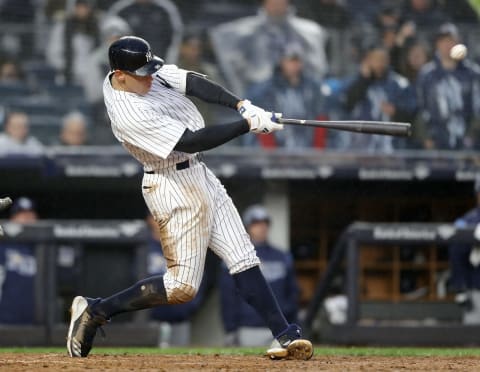
As for Judge, Sanchez, and Severino, extensions for them would be great for the team but seem to be less likely. They have all established themselves as stars already and because of this, they are poised to get substantial pay raises once they start arbitration following the 2019 season. One benefit for Scott Kingery signing his deal is that he is now guaranteed to receive a life-changing amount of money without the risk of injury or poor performance.
This factor is substantially reduced for the three Yankee stars, as their accomplishments thus far have already guaranteed them life-changing money through arbitration, which rewards players for their performance and even more so when they excel. Judge’s top two MVP finish, Sevy’s top three Cy Young finish, and Sanchez’ Silver Slugger award will all add dollars to their arbitration salaries.
Plus, especially for Judge, all three players have endorsement money to keep them comfortable until their salaries rise. Knowing what kind of monstrous payday awaits them once they hit free agency, it seems less likely they would agree to an extension.
However, the one factor the Yankees do have in their favor is the respective ages the Yankees trio will be once free agency finally arrives. Will Judge be the same player he is now when he’s 31 years old? Will Sanchez still be a viable catcher when he’s 30? Will Severino’s arm hold up after logging so many innings?
These are all questions the Yankees should leverage in negotiations, especially given the hesitancy of front offices across the league to give out huge deals to players past their prime.
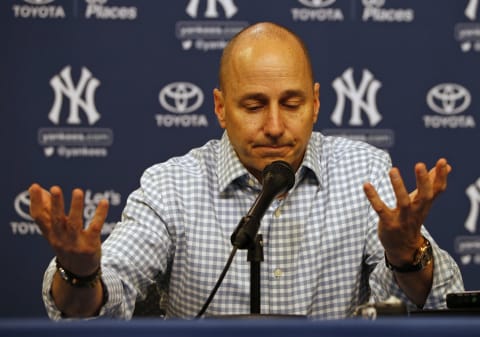
Judge could agree to a deal that buys out one year of his free agency for upwards of $25 million if it guarantees him more money throughout his arbitration years, but overall I think Judge would be the least likely to sign such an extension given the money he’s already making through endorsements.
Severino could command something similar to Corey Kluber’s extension, which bought out one year of free agency for a salary between $14 and 18 million, which is a huge steal barring a significant drop-off from Kluber.
For Sanchez, the Yankees could look towards Buster Posey’s extension, although this wouldn’t be a perfect example as Posey already played three years when his deal was signed.
More from Yankees News
- Aaron Judge Time interview scared Yankees as much as it scared you
- Why weren’t Yankees in on Kodai Senga now that we know the price?
- Baseball Reference proves Yankees’ Aaron Judge lives rent free in Boston
- Yankees’ Clay Holmes trade just became even bigger disaster for Pirates
- Mets stealing New York Post’s entire Yankees offseason plan is hilarious
If they’re able to sign one of these three to an extension and they’re also able to land extensions with both Torres and Andujar (or some of their other top prospects), the Yankees could extend their window of contention another two or so years. Freeing up payroll to resign more of their players or sign new free agents.
This would, of course, require the Steinbrenner’s breaking their cardinal rule of not offering any extensions to people still under contract, but Hal seems open to running things differently than his father, as evidenced by him signing off on being sellers at the 2016 trade deadline.
Next: Miguel Andujar taking control of third base job
There’s no doubt Hal fancies himself as a more efficient, cost-conscious owner, and this would be another way to distinguish himself from his father. In fact, due to the stiff luxury tax penalties, this is the best way to do business and there should be little doubt that The Boss’ way is outdated in the current MLB climate.